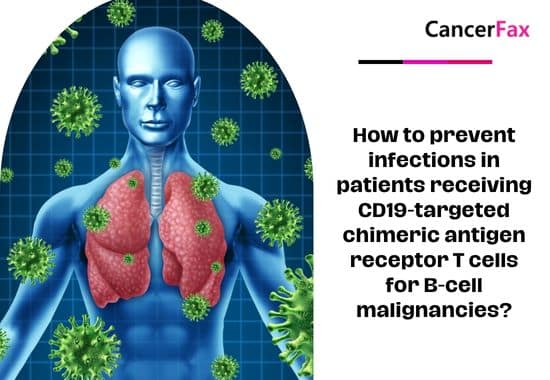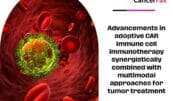CAR T Cell therapy
Chimeric Antigen Receptor (CAR) T-cell therapy has changed the face of treating B-cell malignancies, and it has provided hope to those with relapsed or refractory disease. Through the process of engineering patients’ own T cells to recognize CD19 on tumor B cells, this therapy has shown outstanding success. But navigating through CAR T-cell therapy is filled with risks, especially in terms of infection risk because of severe immunosuppression. This review explores infection prevention strategies in CD19-targeted CAR T-cell therapy patients with a focus on a holistic approach from pre-infusion to follow-up.
Pre Infusion management
Prior CAR T-cell therapy infusion, a careful evaluation of the patient’s history of infection and immune status is of utmost importance. This process entails screening for latent infections, maximizing current comorbidities, and making certain that any present infections are optimally treated.
Infectious Disease Screening: Patients should undergo comprehensive screening for infections such as hepatitis B and C, HIV, and latent tuberculosis. Identifying and managing these conditions preemptively can prevent reactivation during the immunosuppressive phase post-infusion.
Vaccinations: Administering appropriate vaccinations prior to therapy is crucial. Live vaccines are contraindicated due to the risk of vaccine-derived infections in immunocompromised individuals. Instead, inactivated vaccines should be considered, and their administration should be timed to allow adequate immune response before the onset of profound immunosuppression.
Antimicrobial Prophylaxis: Initiating prophylactic antimicrobials can mitigate the risk of opportunistic infections. The choice of agents should be tailored based on the patient’s history, local epidemiology, and institutional protocols.
Post-Infusion Management
The period immediately following CAR T-cell infusion is critical, as patients are susceptible to unique complications that can predispose them to infections.
Cytokine Release Syndrome (CRS) and Neurotoxicity: CRS is a common adverse effect characterized by a systemic inflammatory response, which can compromise mucosal barriers and increase infection risk. Management includes the use of immunosuppressive agents like tocilizumab and corticosteroids, which, while controlling inflammation, can further suppress immune function. Close monitoring and prompt intervention are essential to balance the control of CRS and the prevention of secondary infections.
Monitoring and Early Detection: Regular monitoring for signs of infection is imperative. This includes routine clinical assessments and the use of diagnostic tools such as imaging and laboratory tests to detect infections early and initiate appropriate treatment promptly.
Long-Term Follow-Up
Long after the initial therapy, patients may continue to experience immune dysregulation, necessitating ongoing vigilance.
Hypogammaglobulinemia: B-cell aplasia induced by CAR T-cell therapy can lead to decreased immunoglobulin levels, increasing the risk of infections. Regular monitoring of immunoglobulin levels and supplementation with intravenous immunoglobulin (IVIG) when necessary can help mitigate this risk.
Vaccination Strategies: Revaccination may be necessary as immune recovery occurs. The timing and choice of vaccines should be individualized, considering the patient’s immune status and potential exposure risks.
Patient Education: Empowering patients with knowledge about infection prevention, including hygiene practices, recognizing early signs of infection, and understanding when to seek medical attention, is a cornerstone of long-term care.
Conclusion
Prevention of infection among CD19-targeted CAR T-cell patients is a multi-step process that extends from pre-infusion testing to long-term follow-up. Through exhaustive screening, preventive treatments, close monitoring, and patient education, health care workers can greatly minimize infection-related complications, which in turn can enhance outcomes and quality of life for these patients.
Reference: How I prevent infections in patients receiving CD19-targeted chimeric antigen receptor T cells for B-cell malignancies






Antimicrobial Prophylaxis, B-Cell Malignancies, CD19 CAR T-Cell Therapy, cytokine release syndrome, Hypogammaglobulinemia Management, Immunocompromised Patients, Infection Prevention Strategies, Vaccination Strategies
CancerFax is the most trusted online platform dedicated to connecting individuals facing advanced-stage cancer with groundbreaking cell therapies.
Send your medical reports and get a free analysis.
🌟 Join us in the fight against cancer! 🌟
Привет,
CancerFax — это самая надежная онлайн-платформа, призванная предоставить людям, столкнувшимся с раком на поздних стадиях, доступ к революционным клеточным методам лечения.
Отправьте свои медицинские заключения и получите бесплатный анализ.
🌟 Присоединяйтесь к нам в борьбе с раком! 🌟